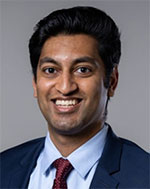Former HIP IMO Trainee Fondly Recalls Summer in Dr. Enderling's Lab at Moffitt
The RET office recently caught up with Dr. Sid Ramesh, a former HIP IMO trainee at Moffitt:
 When did you start at Moffitt, were you an undergrad, grad student, or postdoc; what lab were you in, and what project/s were you working on?
When did you start at Moffitt, were you an undergrad, grad student, or postdoc; what lab were you in, and what project/s were you working on?
I was at Moffitt in the summer of 2015, I was a high school student at the time working in Dr. Heiko Enderling's lab in the Department of Integrated Mathematical Oncology as a part of the HIP IMO program. My project was focused on mathematical and computer-based modeling of non-small cell lung cancer response to alternatively fractionated radiotherapy. I got my first exposure to coding and the applications of theoretical math to tumor biology and medicine in this lab, and it is this experience that inspired me to apply to medical school.
Why did you choose to train at Moffitt?
I chose to train at Moffitt since I was always a math kid growing up, and the Department of Integrated Mathematical Oncology was an incredibly unique route into the applications of the theory that I so much enjoyed.
What were the key things you did while at Moffitt that enabled you to land your current position/role?
Had I not participated in the HIP IMO program at Moffitt, there is a good chance I would not even be in medicine right now. I was truly inspired by the physician scientists who were expert clinicians while also doing groundbreaking, translational research across the hall. I also gained valuable coding experience which positioned me to join labs working on similar types of research in medical school.
Many of my residency interviewers asked what got me interested in radiation oncology as it is such a niche field, and I was able to speak at length about my experience at Moffitt which I felt played a big part in my success in the Match.
The rigor of medical school was challenging in many ways, many people liken it to "drinking from a fire hose", however having already experienced a total immersion into brand new science (a brand new language really) at Moffitt, I felt well prepared to handle this transition.
What are you doing now?
I am extremely excited to say I begin my residency in radiation oncology at the University of Pennsylvania this summer - it is crazy to think my first exposure to the field was when I was a junior in high school and now after medical school, I have come full circle. I feel extremely fortunate to have been matched with my number one choice for radiation oncology residency at Penn.
Do you have any words of advice for current trainees?
Yes! Do not be shy about seeking out mentors; the best mentors will never make you feel like a burden. You are far more capable of achieving your highest goals than you might think. Acknowledge your own feelings of impostor syndrome and make a conscious effort to work through it every day.”
Where Are They Now
- Office of Postdoctoral Affairs
-
Office of Graduate Affairs
- Artificial Intelligence and Machine Learning in Cancer Research PhD
- Cancer Biology PhD
- Cancer Chemical Biology PhD
- Cancer Immunology and Immunotherapy PhD
- Integrated Mathematical Oncology PhD
- Medical Physics PhD
- MD/PhD Program
- Faculty Members
- Graduate Level Oncology Warriors
- Medical Student Training to Enhance Oncology Research
- Office of Undergraduate and Visiting Scholar Affairs
- Pre-College Programs
- What We Provide
- Contact Us
- About Tampa Bay
- News
- Where Are They Now
